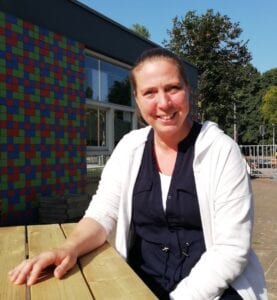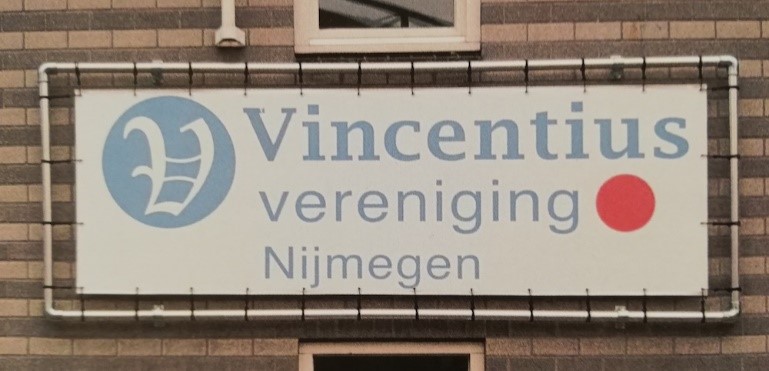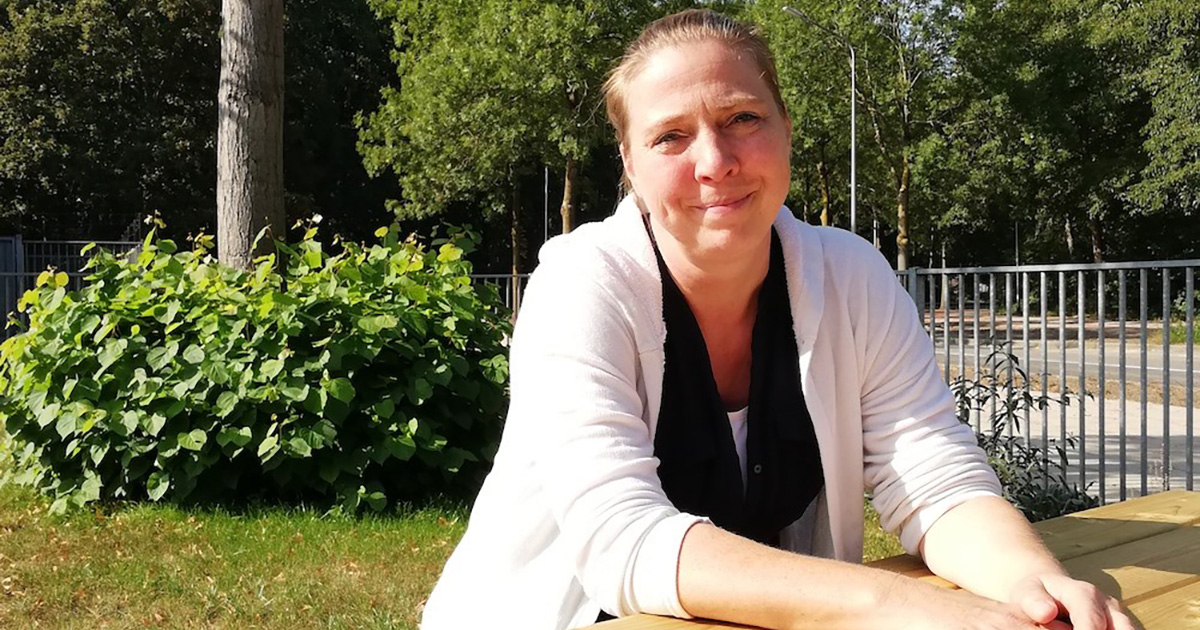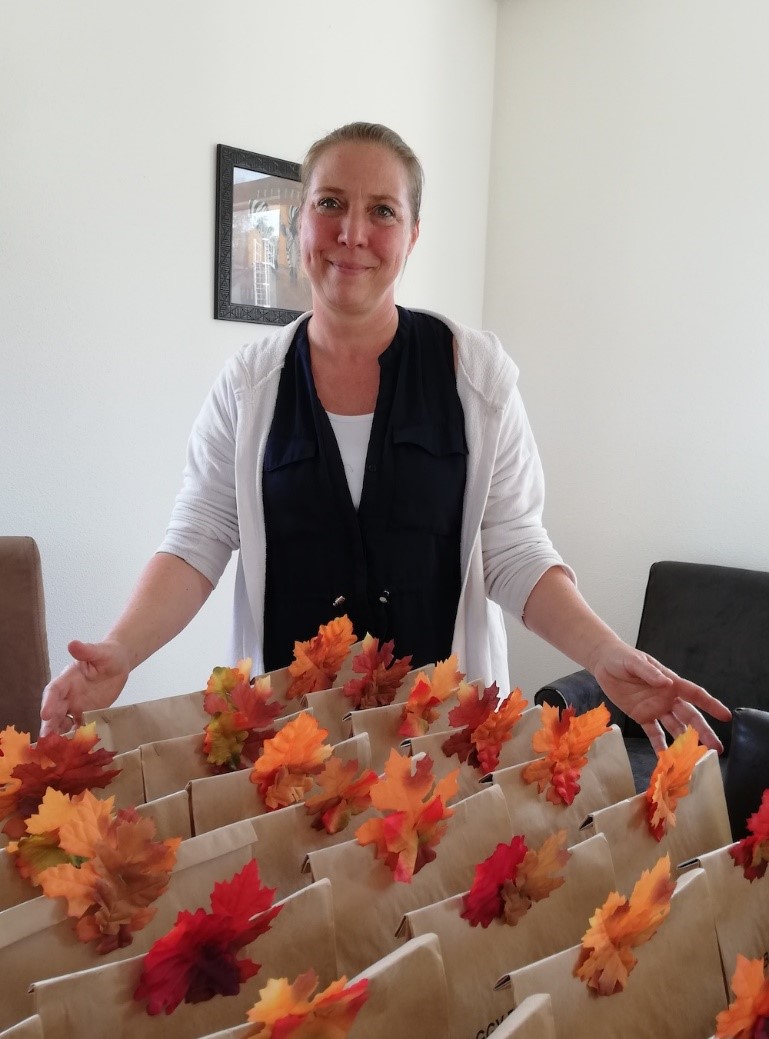Since 2013 Linda van Aken has been the director of, and driving force behind, the Vincentius Nijmegen, which aims to alleviate poverty and loneliness of fellow citizens and can count on the enthusiastic help of a host of loyal volunteers. In 2018 she was proclaimed to be Nijmegen Citizen of the Year.
Like a spider in its web, she sets out guidelines and directs people, and with boundless energy and attention she coordinates the multitude of daily activities in the building that Vincentius has had at its disposal for the past two years, in Horstacker in the Nijmegen neighbourhood of Lindenholt. For these activities continue even under Covid-19 conditions, albeit in adjusted form. Linda: “Because we do not want to forsake people. For every human being counts!”
 Linda, could you please introduce yourself briefly? Where were you born and raised, and what was your family composition like at home?
Linda, could you please introduce yourself briefly? Where were you born and raised, and what was your family composition like at home?
I was born in Andelst in the Betuwe area. After the divorce of my parents – I was three at the time – our family consisted of my mother, my brother and me. When I was nine, we moved to Nijmegen. Recently, my husband, son and I have come to live in Uden.
Can you tell us about your childhood and how you were raised? How have these early years shaped your understanding of human relationships?
A rather difficult question, since on account of my parents’ divorce, and a not particularly friendly father, I had quite a tough childhood. My mother, however, taught me to always be ready whenever people need your help, and that has definitely shaped me. You can be unlucky and come out badly from a bad childhood, but with me things turned out well: my rough childhood made me very sensitive to the needs of others. In this harsh society I cannot but take care of people. I realize that sometimes I do too much to alleviate the needs of others and do not take enough care of myself. A psychologist might notice this rather soon and call it a point of concern. But for me it feels good to live my life like this, caring and giving. It makes me happy. My husband sees this too, and hence encourages me to continue in this way.
At Vincentius you engage in very idealistic activities. When and how were the seeds sown for this idealism? What dreams and expectations of life did you have as a young girl?
Even before I started at Vincentius, I gave hungry people food from my own refrigerator because I could not do otherwise, and because it felt very natural to me to do so. As a young girl I did not know what I wanted to be. From career aptitude tests it appeared I had a natural inclination to take care of elderly people. In puberty I did not fancy this at all, and yet it happened. Taking care of old and young people turns out to suit me quit well, although this did not become apparent until at a later age. For a long time I was a real job-hopper. I am very creative and so tended to like a job as long as I could do my thing and found enough of a challenge in it. But once I had reached my aim, I wanted to move on to a new challenge. Here at Vincentius to an extent I can create those challenges myself and spend my creativity. That’s why I feel at home here.
Today we meet around the theme of “compassion.” What, to you, are important sources of inspiration for living your life, and consorting with people, in a compassionate manner?
My mother served on a welfare committee and supported people on welfare. It was partly thanks to her efforts that the pejorative phrase “welfare case” at a certain moment was replaced by “beneficiary,” a person entitled to welfare. That fighting spirit, to stand up for those who are less well-off, I inherited from her. My grandmother, too, was a great example. She was a very strong woman who at 30 lost my grandfather, at 96 was still living independently, and throughout her life was always willing to help others.
For the rest, compassion just is in me. If you meet someone with a problem, you can call thousands of agencies and talk endlessly, but most often people appeal to you because they have nothing to eat. And I understand quite well the panic in the eyes of people who have nothing to eat. You cannot think of anything else: you just want food for you children and for yourself. So my compassion is triggered by whatever I can do for people, and often enough that is more than you think. For a hug and a bag full of groceries are enormously helpful. If someone is sad, I cry along, and I give a hug whenever I can. At present this cannot be done, but normally one can, and it is greatly appreciated. For this reason I find this Covid-period difficult, for keeping at a distance is not who we are.
Panic in the eyes of hungry people. How big a problem is hunger in the Netherlands in 2020, do you think?
The city of Nijmegen has a good anti-poverty policy, still many people fall through the cracks. People who remain outside the frame, or who are ashamed to appeal to an assistance agency. Many people do not manage despite the city’s good policy. Many families have no financial cushion, so if anything in the home breaks down that causes panic. People also just have a lot of bad luck. Sometimes administrators make a mess of things and will not give out your living allowance, while you have two kids to provide for with no money in your purse. Or you may be in need of expensive A-quality medication, to treat cancer for instance, because your body will not tolerate certain ingredients in the B-quality medication covered by your health-care insurance. In such cases the living allowance will be charged and people will get pinched.
Though people at the Food Bank work tirelessly to put together good food packages, diminishing supplies make this increasingly difficult. Often what people get is inadequate, both in quality and quantity. Freshness often leaves something to be desired. Many people first need to conquer a lot of shame before they apply for assistance, but once they have picked up the courage to take that step, what is offered is often disappointing. Another letdown, on top of the shame they feel. Occasionally you hear that poor people have partly themselves to blame for their situation, for example because they have been tempted to indulge in rash purchases. But such people are a minority. Often there is little they can do about it. As Maria van den Muijsenbergh has shown in her beautiful study, these people are often inclined to act from impulsive rather than rational memory. That’s why they cannot always be held accountable when they make unfortunate choices. It also just happens to people: sometimes no or inadequate precautions have been made for things like funeral expenses. Or people would like to attend a family member’s funeral in Amsterdam and administrators will refuse to make money available. In which case people may tap into their living allowance for the week, and we have an acute problem.
Seven years ago you decided to put new life into a then dormant ‘Vincentius’. And almost out of the blue you managed to do so. What motivates a young woman like you to take up such a challenge?
I am, generally, a passionately driven person, so if I undertake things I tend to do so for 300%. I thought a long time before I declared myself ready to lead Vincentius, but once I had made my decision, I went all-in. What motivates me is the energy I get in return whenever I can help people. Occasionally I need to take a step back to review and enjoy everything we have reached together, otherwise I will just rush on. I like to think up new things, change things and set new goals.
You put 60 hours a week – plus a lot of love and energy – into the Vincentius foundation. You do so as a volunteer, unpaid. That is rather exceptional. How come this choice and dedication?
If this were a paid position I would not be able to do as I please. But precisely because I am a volunteer, I can make conscious decisions to do or not to do certain things, and to plan or not to plan to take my rest at given moments. So I am very much attached to my freedom and my independence.
The Nijmegen ‘Vincentius’ was at standstill when you became its director. How did you start?
For starters, I listened to people to discover what the needs are in Nijmegen. I also contacted the churches. One of the first projects we undertook together with two Nijmegen churches was “Eat & Meet” – the organisation of meals, in order to assuage poverty and loneliness, and to promote a healthy life style.
Of course, we also needed to bring in money, but for this I did not want to appeal to the municipality. I decided that I wanted to generate the requisite means myself. The first step was to set up a thrift shop, which brought in little spurts of money we could then use for new projects. I like ideas. My mind is never at rest, and especially at night new ideas tend to come up. With those ideas I looked for a new board. I wanted to gather the right people about me, people who actively thought and worked along. That’s when I met my present treasurer, and together we have evolved into a golden duo. Everything I think up I propose to him, to which his standard response is that it is impossible because there is no money. But then he digs up all sorts of funds, writes to them, and eventually manages to find a sponsor for my new project. Other board members, too, more and more are inclined to take up an active role as initiators of projects. So even though I am the driving force behind it all, it also feels good to let things go and leave them to others.
When you started as director, you demanded things be done your way. You seem to know quite well what you want and are very attached to your independence and freedom. Is that right? Why are freedom and independence so important for you?
I think I would rapidly lose the pleasure in doing this work if I would be inhibited in my enthusiasm and my creativity. That’s why I am enormously attached to my freedom. You are right that I know quite well what I want. Our volunteers sometimes jokingly call me “the super-boss”, and I direct matters as I see fit. For them, too. My pitfall is my inclination to do too many things on my own, but slowly I am learning to trust good people in my surroundings and to let go. That too is part of “caring for myself”: learning to be confident that things will go well even when I am not around.
Source: Nijmegen, City of Compassion, Newsletter October 2020
Translation: Hans Bak, Em. Professor of American Literature and American Studies, Radboud University, Nijmegen, The Netherlands










0 Comments